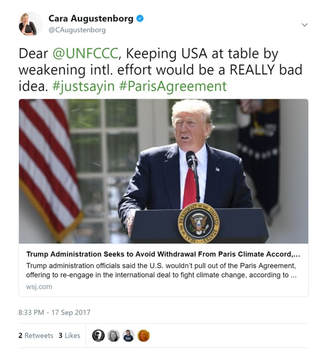| Only the night before the event did I realize this is a rather intimidating task for me –During the last General Election, I was critical of Sinn Fein's (lack of) climate policies in their manifesto, so I wasn’t expecting a warm welcome. Even the topic they asked me to speak about brought me out of my comfort zone because right now, in this crazy world of geopolitics, I find myself conflicted about the role of globalization in climate action… |
Globalization creates the perfect storm
We also know that the transport related to global trade currently contributes to 14% of global emissions, with shipping and aviation emissions (now accounting for 6% of global emissions) expected to double or treble by 2050. More worryingly, because most of our aviation and shipping occur between countries, they’re not included in the Paris Agreement and are thus making slow progress in any kind of emission reduction planning.
| | Plus, these new super trade agreements like TTIP, TTP and CETA all point to further risks to climate and environment through global trade – primarily through their inclusion of an investor dispute system or investor court system, which allow private corporations to sue governments if the governments make decisions that might compromise a company’s profits. |
We also know that almost everything we need to do to address climate change is contrary to the globalization model, namely doing things like encouraging more local and seasonal food purchases and more local energy distribution based on renewables. And we know that the impacts of climate change – in the form of the kind of extreme weather we’ve seen recently -are amplified due to globalization. In other words, extreme weather that happens on one side of the globe now has economic impacts all over the world. We witnessed this during the Russian fires and drought in 2010, which resulted in a ban on wheat export and a spike in global food prices that had a disproportionate effect on people in other developing countries who spend a large percentage of their income on food. We may experience something similar now as parts of Western USA are in a state of emergency due to droughts and fires, some of which they are saying won’t be extinguished until snow falls in October.
An Uncomfortable New Truth
| | Everything about climate change has become uncomfortable since Donald Trump became president – Last week, he stood outside an oil refinery in North Dakota congratulating himself about reopening the Keystone and Dakota pipelines, saying how bad the Paris Agreement was, and that burning oil was more environmentally friendly. |
Corporations are doing it for themselves
This technological transition is not just limited to the insurance sector. The 2017 report “Power Forward 3.0: How the largest U.S. companies are capturing business value while addressing climate change” found 63% of Fortune 100 companies and nearly half of all Fortune 500s have set one or more clean energy targets, with significant numbers of companies setting 100 percent renewable energy goals and science-based greenhouse gas reduction targets to align with the Paris Climate Agreement.
Last May, 30 high-profile CEOs encouraged the US President to honor the U.S. commitment to the Paris Agreement, perhaps because they saw the trend that solar power is becoming cheap enough to push coal and natural-gas plants out of business faster than previously forecast. The current political landscape in Washington may slow this boom, but a great transition from the Industrial Revolution is already there for any corporations who choose to grab it.
| It certainly indicates we need to be even more wary of these new global trade agreements, which pay no heed to climate impacts and give corporations way too much power to obstruct climate action. However, the alternative now being proposed – to weaken international climate efforts to encourage the U.S. to remain in the Paris Agreement – would spell disaster for the climate. So, ironically (and just for now), I find myself advocating for the U.N. Framework Convention on Climate Change (UNFCCC) to wash their hands of the Trump’s America and let States and corporations pave the way to a fossil free future instead. |
What I learned at Sinn Fein Summer School
| They hosted a fabulous debate between Sinn Fein TD Eoin O’Brion and the legendary Vincent Browne asking “Will Sinn Fein be the party to transform Ireland?” and while O’Brion proposed lots of plans to build social housing, not once did he mention the biggest transformation the world (and Ireland) will face in the next 30 years -to get off fossil fuels and adapt to a rapidly changing climate. |





 RSS Feed
RSS Feed